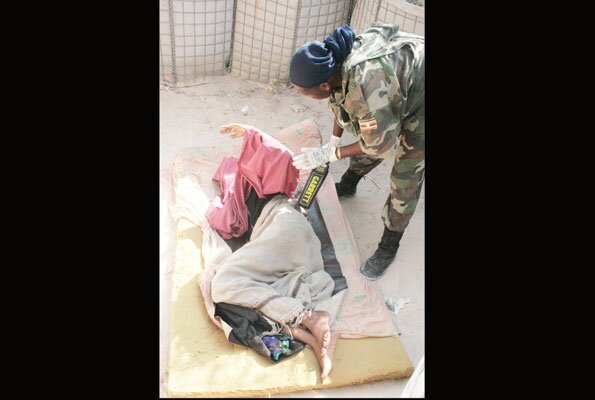A day in the life of two female Ugandan soldiers in Somalia
 Bartamaha (Somalia):- Margaret Lutaaya 24-years-old and Christine Akello 19 from Lira, are female Ugandan troops of the Uganda Peoples’ Defence Forces (UPDF) deployed in the war-ravaged Somali capital Mogadishu under the Amisom force.
Bartamaha (Somalia):- Margaret Lutaaya 24-years-old and Christine Akello 19 from Lira, are female Ugandan troops of the Uganda Peoples’ Defence Forces (UPDF) deployed in the war-ravaged Somali capital Mogadishu under the Amisom force.
They are part of about 200 female troops that make up the current 8,000 Amisom force in Somalia. Their day, like any other soldier, begins as early as 5a.m. with the blowing of a bugle.
From dawn
Taking a bath is a must-do at Halane camp, the Ugandan Contingent headquarters. They have a quick breakfast, comprising bread, eggs, juice and fruits. Eating for Amisom soldiers is done by calorie in-take. This means every soldier is required to ingest a given percentage of calories to perform their duties optimally. This is provided in the numerous selections of foods they are given. The ladies are no exception. Breakfast must be finished.
They assemble for a parade and are given the day’s instructions. For Lutaaya and Akello, deployment varies from day to day. Akello has been stationed in Mogadishu for less than three months now. She looks focused and enthusiastic at her work.
Her comrade Lutaaya has been in Mogadishu for six months. They are both expected to serve for nine months each before they return to Uganda.
Male and female soldiers treated the same way
The two ladies are treated no differently from their male counterparts and are delegated duties like every other soldier. Saturday is particularly stressful and a dangerous day for them.
They are stationed several metres away from a point named the Gate of Hope. Here, thousands of Somalis assemble, waiting to be granted access into the UPDF camp to receive free medical care from the UPDF specialists. It is called the Out-patient day (OPD-day). Citizens from all over the country converge by 4a.m. Lutaaya and Akello spend the whole day in the sun, to ensure every woman and children who come into Halane are not in possession of suspicious items.
Often, the al shabaab and Hizbul Islamists send insurgents as suicide bombers to this entry point of the camp. Some succeed in blowing themselves up to deter the Somali people from receiving free medical help available.
“Items like pocket knives and mobile phones are not allowed beyond this point,” Lutaaya says.
“It’s dangerous working at the Halane but we must do it. But I feel satisfied to know that with my service and kind of work, I’m protecting many people. This makes the fear of danger go away,” Akello adds.
Women and children given priority for treatment
Apart from fearing the suicide bombers and the hot Somali sunshine, Akello and Lutaaya are exposed to horrific sights and even disease as they check the ill people. Surgical gloves in addition to the guns and weapon detectors are a part of what they are supplied with.
“We’ve seen very ill people in their worst state. As a woman, it is sometimes very sad to see fellow women suffering but we perform our duties. So you brush it off as another ill person comes your way,” Lutaaya says.
In the camp, women and children are given more priority. They’re registered, directed to the waiting area for medical care. Under the supervision of 30 UPDF soldiers, they’re provided outpatient facilities and when the need arises, patients are evacuated to an army field hospital located within the camp. The common ailments doctors encounter include malnourished children, dental disease, eye problems, and trauma as a result of gunshot, wounds, rape, bodily worms of all types and fistula.
Like the doctors, language barrier is a challenge for Lutaaya and Akello. Because none of them speaks Somali, they rely on translators affiliated to Amisom. These too are in great danger because they don’t stay in the camp but just work for Amisom.
Taking turns to have lunch
Lunch is always served at the work station. Akello and Lutaaya, take turns to eat as the others work. At every point, one is on high alert. The Gate of hope is closed by 4p.m. In Somalia, darkness falls by 5p.m, so by this time, all the patients must leave the camp and when night falls, civilians, unless accredited by Amisom are not allowed to move unescorted within the camp.
As another day winds down for the two ladies, memories of the day’s happenings still linger in their minds. “It is difficult to hold back emotions because we are human and feel the pain of these people,” Akello says.
As a routine, they take a bath and have dinner between 6.30p.m. and 8.30p.m. they are off to bed. They don’t have to worry since another team stays on guard until day break. As silence engulfs the camp, the distant sound of mortar and gunfire is a reminder that out their comrades continue to keep the peace.
Communication back home
All Amisom officers have Somali phone numbers which they use to call back to their families. The officers also send letters and messages with their colleagues who happen to be coming back for short holidays. But each officer gets a one week holiday back to Ugandan every two months although this is not regular with everyone and this depends on the security situation.
======================
Source:-Saturday Monitor.
Comments
comments
 Calendar
Calendar




































